
Arend Bloem (born 31 August 1947, Wormer) is a Dutch sprint canoer who competed in the late 1970s. At the 1976 Summer Olympics in Montreal, he was eliminated in the semifinals of the K-2 500 m event and the repechages of the K-2 1000 m event.

Arend Bloem (born 31 August 1947, Wormer) is a Dutch sprint canoer who competed in the late 1970s. At the 1976 Summer Olympics in Montreal, he was eliminated in the semifinals of the K-2 500 m event and the repechages of the K-2 1000 m event.

In probability theory and statistics, the binomial distribution with parameters n and p is the discrete probability distribution of the number of successes in a sequence of n independent experiments, each asking a yes–no question, and each with its own Boolean-valued outcome: success or failure. A single success/failure experiment is also called a Bernoulli trial or Bernoulli experiment, and a sequence of outcomes is called a Bernoulli process; for a single trial, i.e., n = 1, the binomial distribution is a Bernoulli distribution. The binomial distribution is the basis for the binomial test of statistical significance.

A black hole is a region of spacetime where gravity is so strong that nothing, not even light, can escape it. Albert Einstein's theory of general relativity predicts that a sufficiently compact mass can deform spacetime to form a black hole. The boundary of no escape is called the event horizon. A black hole has a great effect on the fate and circumstances of an object crossing it, but has no locally detectable features according to general relativity. In many ways, a black hole acts like an ideal black body, as it reflects no light. Quantum field theory in curved spacetime predicts that event horizons emit Hawking radiation, with the same spectrum as a black body of a temperature inversely proportional to its mass. This temperature is of the order of billionths of a kelvin for stellar black holes, making it essentially impossible to observe directly.
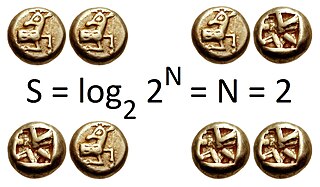
In information theory, the entropy of a random variable quantifies the average level of uncertainty or information associated with the variable's potential states or possible outcomes. This measures the expected amount of information needed to describe the state of the variable, considering the distribution of probabilities across all potential states. Given a discrete random variable , which takes values in the set and is distributed according to , the entropy is where denotes the sum over the variable's possible values. The choice of base for , the logarithm, varies for different applications. Base 2 gives the unit of bits, while base e gives "natural units" nat, and base 10 gives units of "dits", "bans", or "hartleys". An equivalent definition of entropy is the expected value of the self-information of a variable.
In probability theory, the Borel–Cantelli lemma is a theorem about sequences of events. In general, it is a result in measure theory. It is named after Émile Borel and Francesco Paolo Cantelli, who gave statement to the lemma in the first decades of the 20th century. A related result, sometimes called the second Borel–Cantelli lemma, is a partial converse of the first Borel–Cantelli lemma. The lemma states that, under certain conditions, an event will have probability of either zero or one. Accordingly, it is the best-known of a class of similar theorems, known as zero-one laws. Other examples include Kolmogorov's zero–one law and the Hewitt–Savage zero–one law.
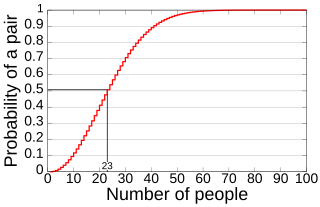
In probability theory, the birthday problem asks for the probability that, in a set of n randomly chosen people, at least two will share the same birthday. The birthday paradox refers to the counterintuitive fact that only 23 people are needed for that probability to exceed 50%.
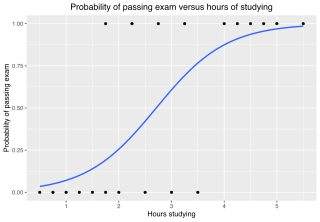
In statistics, the logistic model is a statistical model that models the log-odds of an event as a linear combination of one or more independent variables. In regression analysis, logistic regression estimates the parameters of a logistic model. In binary logistic regression there is a single binary dependent variable, coded by an indicator variable, where the two values are labeled "0" and "1", while the independent variables can each be a binary variable or a continuous variable. The corresponding probability of the value labeled "1" can vary between 0 and 1, hence the labeling; the function that converts log-odds to probability is the logistic function, hence the name. The unit of measurement for the log-odds scale is called a logit, from logistic unit, hence the alternative names. See § Background and § Definition for formal mathematics, and § Example for a worked example.

Adam Joseph van Koeverden is a Canadian sprint kayaker and politician. He is an Olympic gold medallist in the K-1 500m category (2004) and a two-time world champion in K-1 500 (2007) and K-1 1000 (2011), winning four Olympic and eight world championship medals. His home club is the Burloak Canoe Club in Oakville, Ontario.
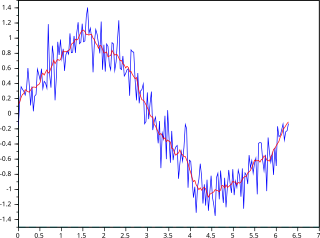
In statistics, a moving average is a calculation to analyze data points by creating a series of averages of different selections of the full data set. Variations include: simple, cumulative, or weighted forms.
The surface gravity, g, of an astronomical object is the gravitational acceleration experienced at its surface at the equator, including the effects of rotation. The surface gravity may be thought of as the acceleration due to gravity experienced by a hypothetical test particle which is very close to the object's surface and which, in order not to disturb the system, has negligible mass. For objects where the surface is deep in the atmosphere and the radius not known, the surface gravity is given at the 1 bar pressure level in the atmosphere.
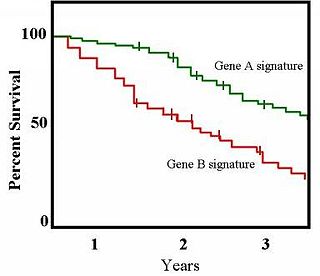
The Kaplan–Meier estimator, also known as the product limit estimator, is a non-parametric statistic used to estimate the survival function from lifetime data. In medical research, it is often used to measure the fraction of patients living for a certain amount of time after treatment. In other fields, Kaplan–Meier estimators may be used to measure the length of time people remain unemployed after a job loss, the time-to-failure of machine parts, or how long fleshy fruits remain on plants before they are removed by frugivores. The estimator is named after Edward L. Kaplan and Paul Meier, who each submitted similar manuscripts to the Journal of the American Statistical Association. The journal editor, John Tukey, convinced them to combine their work into one paper, which has been cited more than 34,000 times since its publication in 1958.
Steven Sean Ferguson is a sprint canoeist, surf lifesaver and former swimmer from New Zealand.
The 2005 ICF Canoe Sprint World Championships were held in Zagreb, Croatia, in August 2005.

Canoeing has been featured as competition sports in the Summer Olympic Games since the 1936 Games in Berlin, and they were also demonstration sports at the 1924 Games in Paris. There are two disciplines of canoeing in Olympic competition: slalom and sprint.

The 2007 ICF Canoe Sprint World Championships were held in Duisburg, Germany on 9–12 August 2007 for the record-tying fourth time. The German city had hosted the championships previously in 1979, 1987, and 1995. It tied Duisburg with Belgrade, Serbia who hosted in 1971, 1975, 1978, and 1982.

The 2010 ICF Canoe Sprint World Championships were held 19–22 August 2010 in Poznań, Poland, on Lake Malta. This was the third time that the Polish city hosted the championships, having done so previously in 1990 and 2001. Paracanoe and the women's C-1 200 m events that were exhibition events at the previous world championships in Dartmouth, Nova Scotia, Canada, became official events at these championships.

The Paleocene, or Palaeocene, is a geological epoch that lasted from about 66 to 56 million years ago (mya). It is the first epoch of the Paleogene Period in the modern Cenozoic Era. The name is a combination of the Ancient Greek παλαιός palaiós meaning "old" and the Eocene Epoch, translating to "the old part of the Eocene".

In probability theory and statistics, the Poisson distribution is a discrete probability distribution that expresses the probability of a given number of events occurring in a fixed interval of time if these events occur with a known constant mean rate and independently of the time since the last event. It can also be used for the number of events in other types of intervals than time, and in dimension greater than 1.

The Cretaceous–Paleogene (K–Pg) extinction event, also known as the K–T extinction, was the mass extinction of three-quarters of the plant and animal species on Earth approximately 66 million years ago. The event caused the extinction of all non-avian dinosaurs. Most other tetrapods weighing more than 25 kg (55 lb) also became extinct, with the exception of some ectothermic species such as sea turtles and crocodilians. It marked the end of the Cretaceous period, and with it the Mesozoic era, while heralding the beginning of the current era, the Cenozoic. In the geologic record, the K–Pg event is marked by a thin layer of sediment called the K–Pg boundary, Fatkito boundary or K–T boundary, which can be found throughout the world in marine and terrestrial rocks. The boundary clay shows unusually high levels of the metal iridium, which is more common in asteroids than in the Earth's crust.
The 2017 ICF Canoe Sprint World Championships, the 43rd edition of the World Championships, were held in Račice, Czech Republic, from 23 to 27 August 2017.